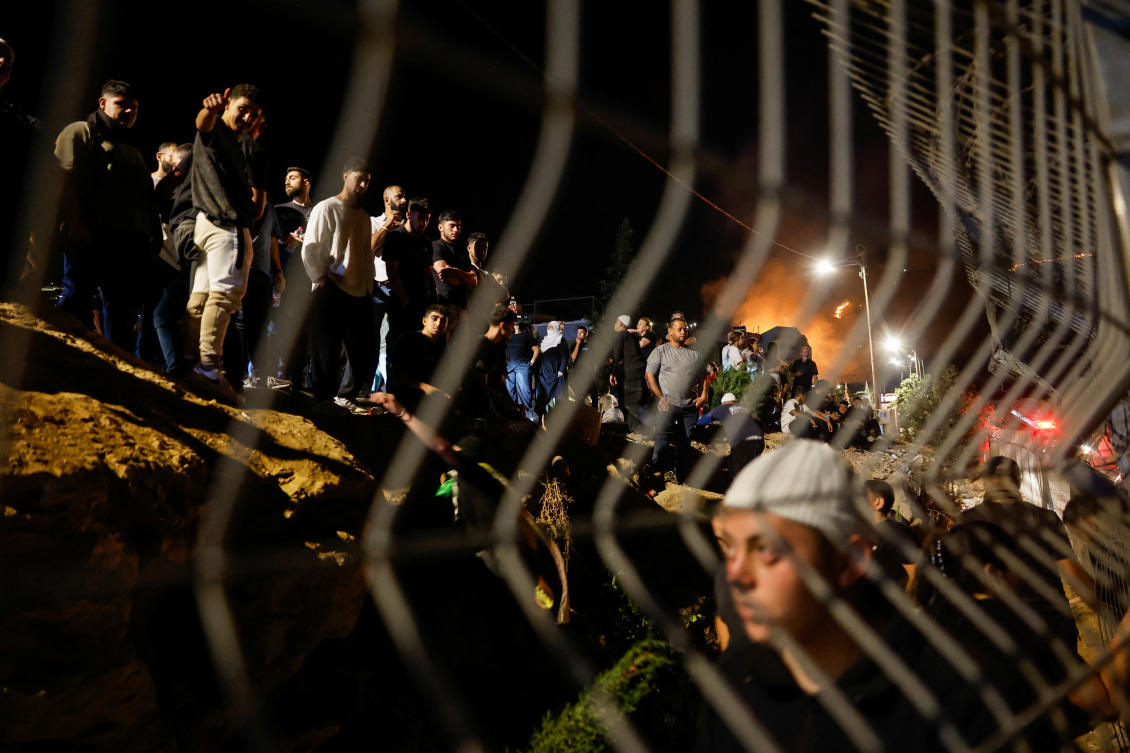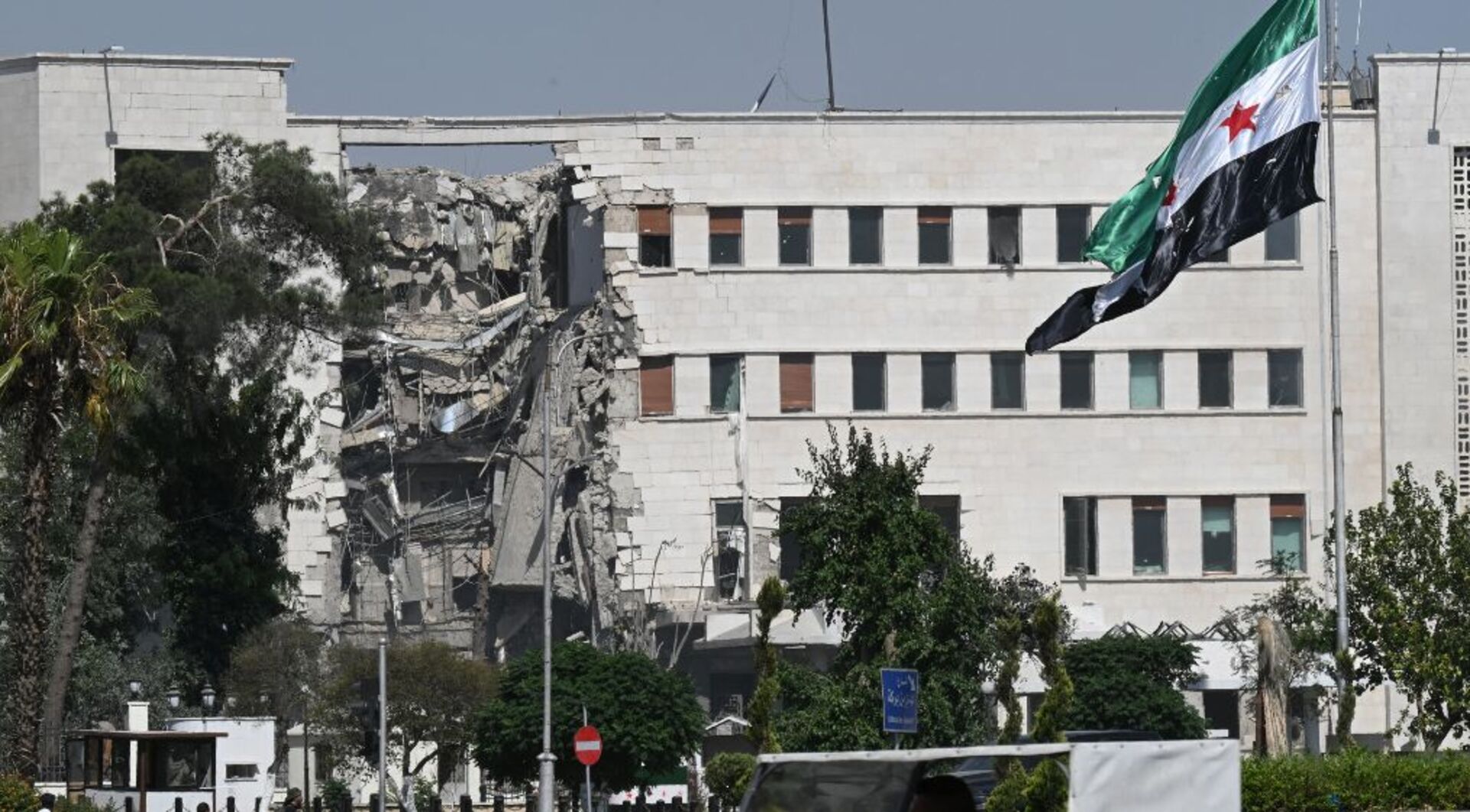The United States said early Saturday that it had negotiated a ceasefire between Israel and Syria's government as new clashes erupted in Syria's Druze...
Vous n'êtes pas connecté
Rubriques :
 - EURASIAREVIEW.COM - A la une - Hier 00:55
- EURASIAREVIEW.COM - A la une - Hier 00:55
Al-Sharaa: True Or False? – OpEd
Ahmed al-Sharaa, the interim President of Syria, has the world guessing. Is he the Sunni jihadist leader of an Islamic militia with historic ties to al-Qaeda, planning to covert Syria into a autocratic Islamist state governed by strict Sharia law? Or has he reinvented himself as a democratic leader in the making, determined to transform Syria into a unified, inclusive, prosperous nation pledged to maintain freedom of opinion and expression, at peace with itself and the region? With US President Donald Trump’s recent description of him as a "young, attractive guy," his optimism about Sharaa having "a real shot at holding it together," and his decision to lift US sanctions on Syria, the balance would seem to be shifting in Sharaa’s favor. Even so, for the moment Sharaa remains an enigma. The transformation from what he was, to what he seems to aspire to become, has been too sudden to convince many of its authenticity. Ten years ago Sharaa was leading a fighting militia closely tied to al-Qaeda. In March 2015, under his nom de guerre of Abu Mohammad al-Jolani, he participated in the onslaught on the governorate of Idlib in north-western Syria. After a week or so of fighting, the Islamist coalition captured Idlib city from Syrian government forces, and took control of the region. By early 2019 Jolani’s militia, Hay'at Tahrir al-Sham (HTS), had became the de facto ruler of the entire Idlib governorate and surrounding areas, in defiance of the regime of Bashar al-Assad, Syria’s then-president. There Sharaa ruled for nearly six years. Compared to other parts of war-torn Syria, Idlib under HTS was seen by some as relatively stable and orderly, especially in areas like traffic control, civil policing, and municipal services. They ran courts, managed utilities, and collected taxes. NGOs reported that basic services were functional, even amid war and airstrikes. The downside was that HTS was widely criticized for cracking down on rival factions, activists, journalists, and protesters. Arrests, disappearances, and suppression of free expression were common. The legal system was based on Islamic law, and critics noted it lacked transparency, with harsh sentences and little recourse for appeal. In the first days of December 2024 a convergence of strategic, political, and military factors created a unique opportunity for Sharaa to take action. The previous month his HTS had captured Aleppo, the large governorate to the east of Idlib. Its fall had exposed the Assad regime's weakening grip on power. Assad's unsuccessful appeal for Russian military assistance further underscored the regime's growing isolation and vulnerability. So Sharaa seized the day. Leading his highly trained HTS, he swept down from the north, easily trounced Syrian government forces, and in a matter of days captured Damascus and overthrew the regime of Bashir al-Assad. On December 8, 2024 then-prime minister, Mohammad Ghazi al-Jalali, announced a transitional arrangement for the governance of Syria. Sharaa would assume the leadership as head of the New Syrian Administration. Subsequently, on January 29, during the Syrian Revolution Victory Conference in Damascus, the Syrian General Command formally appointed Sharaa as president of Syria for the transitional period. On Sunday, July 13 members of a Bedouin tribe attacked and robbed a Druze man on the main highway in Syria’s Suwayda province. Suwayda was a tinder-box ready to be ignited. The memory was still raw of the deadly confrontations between Druze residents and Sunni Bedouin armed groups that occurred between April 28 and May 2 – all due to a fake audio clip – and the heavy-handed intervention by Syrian government forces which carried out so-called extrajudicial “field executions” of 19 Druze civilians. More than 100 Druze were killed in the subsequent fighting. During the outbreak of sectarian violence in Suwayda on July 13 more than two hundred people were killed. Over the next few days militias affiliated with the new regime in Damascus attacked members of the Druze community. As the violence spread, Syrian military forces entered the region. In Israel members of the Druze minority organized demonstrations, demanding that the government act immediately to protect their co-religionists across the border. Israel lived up to its promise. It mounted air strikes, targeting Syrian tanks moving south from Damascus, as well as other Syrian Army vehicles and an airfield in southwestern Syria. The same day, Syria’s defense minister, Murhaf Abu Qasra, secured an agreement between the combatants – the Syrian army, Druze armed factions and Bedouin tribes – and a ceasefire was declared. Unfortunately it soon broke down, and Israel continued its campaign by targeting key Syrian government structures in Damascus, including the Defense Ministry headquarters and areas in the vicinity of the Presidential Palace.Efforts to reach a ceasefire in Suwayda continued and, backed by US mediation, an agreement was reached between the Syrian army and Druze factions. Government forces began withdrawing. Meanwhile, on the evening of July 16, Sharaa gave a televised address to the nation. What he said was entirely in line with what he has been asserting as his intentions from the moment he was appointed Syria’s interim president on January 29, 2025. His first major decision had been to suspend the Assad-era constitution. In his six months as interim president he has overseen the drafting of an interim constitution for a five-year transition period. This document commits the nation’s governance to unity and inclusivity, explicitly pledges to maintain freedom of opinion and expression, and establishes a People’s Committee to function as an interim parliament. He seems to have made every effort to distance himself from his al-Qaeda roots, and to present a moderate and pragmatic image. In public statements he has emphasized his intention to protect minorities and transform Syria into a pluralist state. In speaking to the Syrian people on July 16, Sharaa asserted the nation’s sovereignty, but nevertheless praised mediation from foreign sources. In line with his declared aim of national unity and the protection of minorities, he said: “We are keen on holding accountable those who transgressed and abused our Druze people, as they are under the protection and responsibility of the state.” In a statement virtually seeking conciliation with Israel, he said that the nation did not fear war, “but we have put the interests of the Syrians before chaos and destruction.” Before the recent upsurge of violence, several pointers had suggested possible Israel-Syria reconciliation. For example, on April 18 Congressman Cory Mills held a 90minute meeting with Sharaa in Damascus during which, Mills reported, Sharaa expressed openness to normalizing relations with Israel, stating Syria could consider joining the Abraham Accords under the right conditions. Then, during Sharaa’s visit to French President Emmanuel Macron on May 7, both leaders confirmed that Syria has held indirect talks with Israel through mediators. Sharaa expressed openness to "technical discussions" with Israel. There is no doubt that the tenor of remarks by Sharaa from the start of his governance seem to favor conciliation toward Israel. They suggest a potential openness to the principles of regional normalization and cooperation embodied in the Abraham Accords. If he eventually delivers the inclusive, unified, well-governed state that he promises, he will have disproved those who currently regard him with suspicion and believe that he can never rid himself of his Al-Qaeda past.
Articles similaires
US announces Syria-Israel truce as new clashes rock Druze heartland
The United States said early Saturday that it had negotiated a ceasefire between Israel and Syria's government as new clashes erupted in Syria's Druze...
Syria’s Sharaa says protecting Druze citizens is ‘our priority’
article author: ReutersAuthor: ReutersID: 1752725368391808000Thu, 2025-07-17 03:20 DAMASCUS/CAIRO: Syria’s interim President Ahmed Al-Sharaa...
Who are the Druze and why is Israel bombing Syria to protect them?
By Mostafa Salem, Mohammed Tawfeeq and Hira Humayun, CNN Explainer: Syria has been wracked by a new wave of deadly sectarian violence that has placed...
After powerful Israeli strikes on Damascus, Syria withdraws troops from Suwayda city to avoid ‘open war’
CNN — Israel carried out a series of powerful strikes on the Syrian capital Damascus Wednesday, escalating a campaign it says is in support of the...
After powerful Israeli strikes on Damascus, Syria withdraws troops from Suwayda city to avoid ‘open war’
CNN — Israel carried out a series of powerful strikes on the Syrian capital Damascus Wednesday, escalating a campaign it says is in support of the...
What’s the real motive behind Israel’s involvement in Syria? | TV Shows
Israel has repeatedly bombed Damascus, saying it is defending the Druze minority. Israeli warplanes have struck Damascus – part of a wave of...
Israel May Be Using Syrian Raid on Druze Community to Overthrow Sharaa Gov’t - Politician
ST. PETERSBURG (Sputnik) - Israel may have struck Syria under the pretext of protecting the religious Druze minority in Suwayda in a bid to overthrow...
FACTBOX – Who are the Druze and why are they central to Israel’s attacks on Syria?
Spiraling violence in Syria has turned global attention to the Druze community, a minority group at the center of recent clashes in the southern...
FACTBOX – Who are the Druze and why are they central to Israel’s attacks on Syria?
Spiraling violence in Syria has turned global attention to the Druze community, a minority group at the center of recent clashes in the southern...
Les derniers communiqués
-
Argonne National Laboratory Celebrates Aurora Exascale Computer
Intel - 19/07/2025
-
Meta to invest hundreds of billions in superintelligence efforts
Meta - 16/07/2025
-
NASA discovers 'super Earth' planet emitting mysterious signal
National Aeronautics and Space Administration - 16/07/2025
-
Amazon Prime Day 2025 Delivers Record Sales and Savings in Expanded Four-Day Shopping Event
AMAZON - 12/07/2025
-
DHS Reveals Criminal Histories of Illegal Aliens Detained at Prairieland Detention Center at Time of July 4 Attack
The Department of homeland security - 11/07/2025
-
Henson Group and myCloudDoor Merge to Form ALIANDO, a Leading, Global Microsoft Partner
Henson Group - 10/07/2025
-
Their ability to enter and operate in the United States emphasized the danger of letting violent offenders exploit our border—and reinforces why the Trump Administration refuses to let its guard down. HSI Omaha led the operation with support from federal and international law enforcement partners. ICE currently holds both individuals in custody. The agency has initiated removal proceedings and will continue coordinating with El Salvadoran authorities to send them back to face justice.
The Department of homeland security - 10/07/2025
-
Their ability to enter and operate in the United States emphasized the danger of letting violent offenders exploit our border—and reinforces why the Trump Administration refuses to let its guard down. HSI Omaha led the operation with support from federal and international law enforcement partners. ICE currently holds both individuals in custody. The agency has initiated removal proceedings and will continue coordinating with El Salvadoran authorities to send them back to face justice.
The Department of homeland security - 10/07/2025
-
ICE Takes Down High-ranking MS-13 Gang Leaders Wanted for Murder
The Department of homeland security - 10/07/2025
-
Buy with Prime Expands with New Brand Dr. Berg Nutritionals
AMAZON - 09/07/2025

